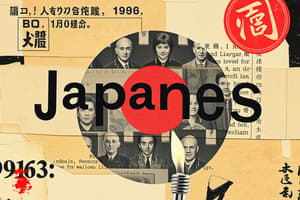Podcast
Questions and Answers
What is the meaning of the term 'でんしゃにまにあいます'?
What is the meaning of the term 'でんしゃにまにあいます'?
- to be late for the train
- to be delayed
- to participate in a meeting
- to be in time for the train (correct)
Which of the following translates to 'to search (for something)'?
Which of the following translates to 'to search (for something)'?
- おくれます
- もえます
- みます
- さがします (correct)
What does 'きぶんがわるい' mean?
What does 'きぶんがわるい' mean?
- to feel good
- to feel nervous
- to feel excited
- to feel sick (correct)
Which term means 'garbage disposal method'?
Which term means 'garbage disposal method'?
What is the English translation of 'つごうがわるい'?
What is the English translation of 'つごうがわるい'?
Which of the following means 'to put out the trash'?
Which of the following means 'to put out the trash'?
What does the term 'うちゅうひこうし' refer to?
What does the term 'うちゅうひこうし' refer to?
Which word means 'rubbish'?
Which word means 'rubbish'?
Flashcards are hidden until you start studying
Study Notes
Medical and Daily Activities
- Medical examination is expressed as みます (mimasu).
- Searching for something is referred to as さがします (sagashimasu).
- Being late or delayed in schedule is indicated by おくれます (okuremasu).
- Specific to trains, being late is でんしゃにおくれます (densha ni okuremasu), while being on time is でんしゃにまにあいます (densha ni maniaimasu).
Participation and Engagement
- To perform or undertake an activity, use やります (yarimasu).
- Attending events is noted as さんかします (sankashimasu), with attending a party specifically as パーティーにさんかします (pātī ni sankashimasu).
Applications and Convenience
- The action of applying for something, such as marriage or mediation, is expressed with もうしこみます (moushikomi masu).
- A convenient time is つごうがいい (tsugou ga ii), while an inconvenient time is つごうがわるい (tsugou ga warui).
Health and Well-being
- Feeling good is described as きぶんがいい (kibun ga ii) and feeling unwell as きぶんがわるい (kibun ga warui).
Contextual Vocabulary
- Newspaper company is しんぶんしゃ (shinbunsha).
- Judo is expressed as じゅうどう (jūdō).
- Athletic meets or sports days are referred to as うんどうかい (undoukai).
Locations and Volunteering
- Place or location can be referred to as ばしょ (basho).
- Volunteer work is denoted by ボランティア (borantia).
Dialects and Timing
- Dialect or accent is marked with the suffix ~べん (ben).
- Next time or another time is こんど (kondo).
Intensity and Directness
- Extreme or surprising situations are signified with ずいぶん (zuibun).
- Direct or personal interactions are indicated as ちょくせつ (chokusetsu).
General Terms
- At any time is いつでも (itsudemo), while anywhere is どこでも (dokodemo), and anybody or anyone is だれでも (dare demo).
- Any selection is referred to as なんでも (nandemo).
Comparisons
- To indicate something near the speaker, use こんな~ (konna~); for something near the listener, use そんな~ (sonna~); and for something distanced from both, use あんな~ (anna~).
Special Days and Cleanliness
- Children's Day is celebrated on May 5th as こどものに (Kodomo no Hi).
- The process of organizing is indicated by かたづきます (katazukimasu).
Waste Management
- Rubbish or trash is referred to as ごみ (gomi).
- Putting out the trash is ごみをだします (gomi o dashimasu).
- Types of waste include burnable (もえるごみ, moeru gomi) and non-burnable trash (もえないごみ, moenai gomi).
Weekday Abbreviations
- For the days of the week: Mon-Wed-Fri is expressed as げっすいきん (gessuikin).
Storage and Objects
- Place for items or storage is おきば (okiba).
- Specifications for containers: Side of a box is よこ (yoko), bottle is びん (bin), can is かん (kan).
Everyday Utilities
- Hot water is called おゆ (oyu).
- Gas in a gaseous state is referred to as ガス (gasu).
Communication and Emotions
- To contact someone is れんらくします (renrakushimasu), while feeling embarrassed might lead to the phrase こまったなあ (komattanaa).
- Email is known as でんしメール (denshi mēru).
Cosmic Terms
- Universe or space is referred to as うちゅう (uchuu).
- Adventure and exploration terms include space ship (うちゅうせん, uchūsen) and astronaut (うちゅうひこうし, uchūhikōshi).
Waste Management Practices
- Garbage disposal methods are referred to as ゴミのだしかた (gomi no dashikata).
- Types of paper waste are かみくず (kamikuzu) and kitchen or food scraps are なまゴミ (namagomi).
- Household electrical appliances are noted as かていでんかせいひん (katei denkaseihin).
- Empty containers include あきかん (akikan, for cans) and あきびん (akibin, for bottles).
- Old newspapers are expressed as ふるしんぶん (furushinbun).
Studying That Suits You
Use AI to generate personalized quizzes and flashcards to suit your learning preferences.




